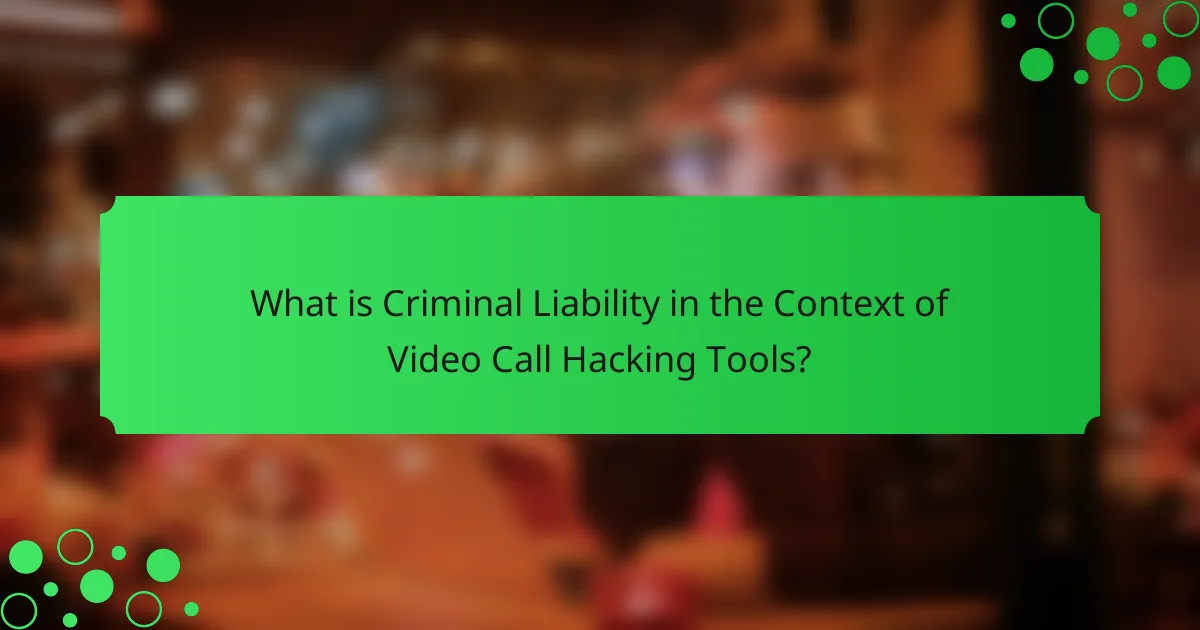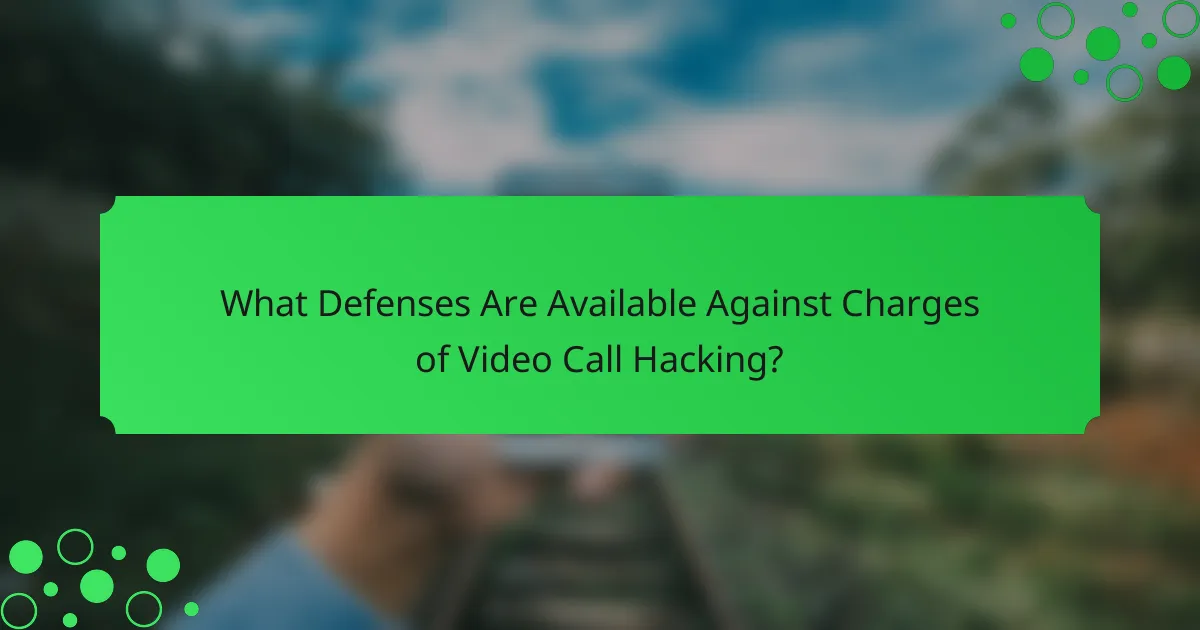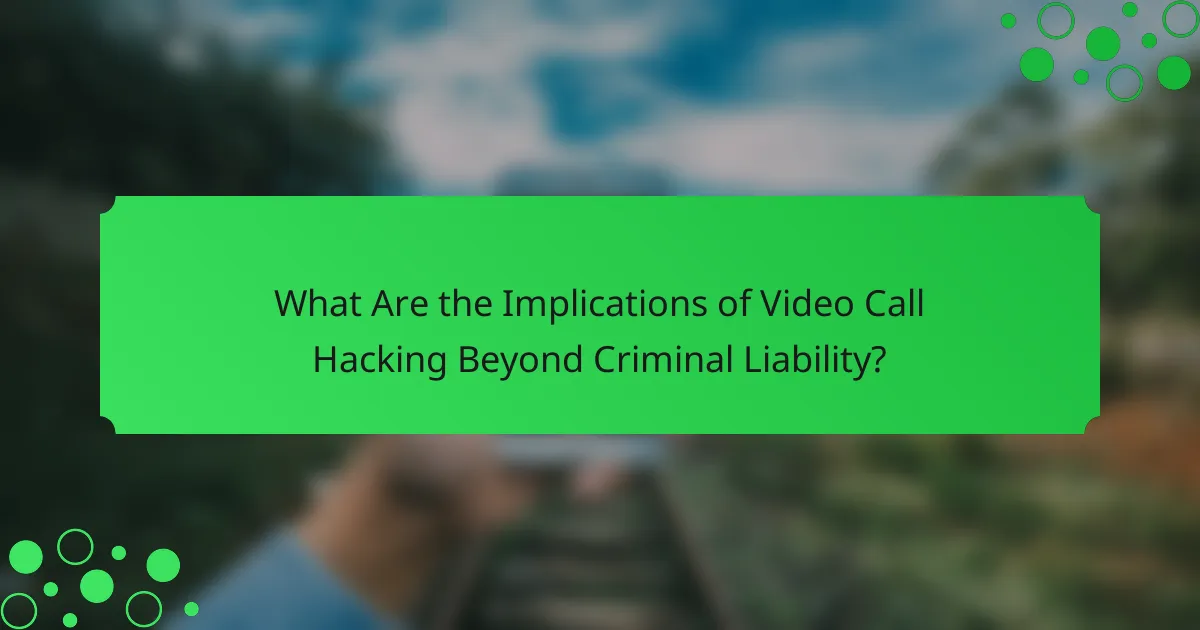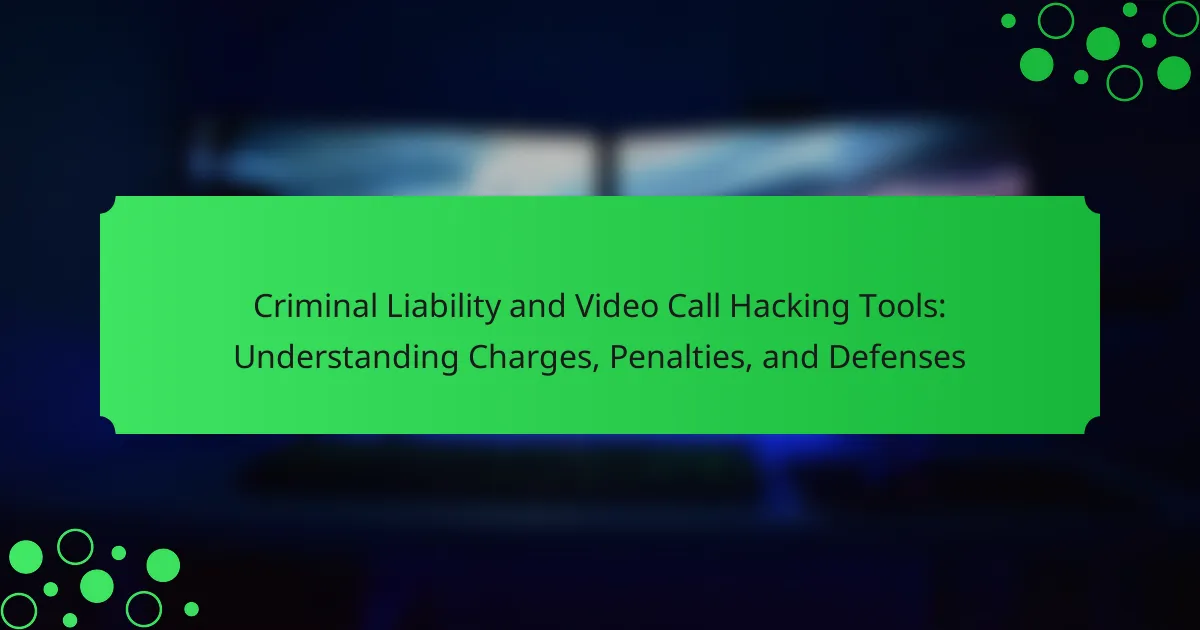Criminal liability in the context of video call hacking tools pertains to the legal responsibility for unauthorized access to video communications, which can infringe upon laws such as the Computer Fraud and Abuse Act. The article examines the various charges and penalties associated with video call hacking, including potential fines and imprisonment, while also discussing defenses such as lack of intent, consent, and technical impossibility. Additionally, it highlights the broader implications of video call hacking, including privacy violations, reputational damage for organizations, and the emotional distress experienced by victims. The discussion emphasizes the need for increased scrutiny on digital privacy and the potential for stricter regulations in response to the rise of cybercrime related to remote communication.

What is Criminal Liability in the Context of Video Call Hacking Tools?
Criminal liability in the context of video call hacking tools refers to the legal responsibility for unauthorized access to video communications. This includes actions such as hacking into video calls, which can violate laws like the Computer Fraud and Abuse Act in the United States. Individuals found guilty can face severe penalties, including fines and imprisonment. The severity of the charges often depends on the intent and the harm caused. For example, accessing private conversations without consent can lead to civil lawsuits in addition to criminal charges. Cases involving video call hacking have increased, especially during the rise of remote work. Law enforcement agencies actively investigate such incidents to deter cybercrime.
How is Criminal Liability Defined in Cybercrime?
Criminal liability in cybercrime is defined as the legal responsibility for engaging in illegal activities conducted through digital means. This includes actions such as hacking, identity theft, and distribution of malware. The law holds individuals accountable for their conduct online, similar to traditional crimes. Evidence of intent and action is crucial in establishing liability. For instance, unauthorized access to computer systems can lead to criminal charges. Statutes like the Computer Fraud and Abuse Act outline specific offenses and penalties. Courts assess both the act and the intent behind cybercrimes to determine liability.
What are the key components of Criminal Liability?
The key components of criminal liability are actus reus, mens rea, and causation. Actus reus refers to the physical act or conduct that constitutes a criminal offense. It can involve an action, a failure to act, or a state of being. Mens rea is the mental state or intent of the individual at the time of committing the act. It determines whether the individual acted with purpose, knowledge, recklessness, or negligence. Causation establishes a direct link between the actus reus and the resulting harm or consequence. It shows that the defendant’s actions led to the outcome in question. These components are essential in determining whether an individual can be held criminally liable for their actions.
How does intent factor into Criminal Liability?
Intent is a crucial element in determining criminal liability. It distinguishes between different levels of culpability. In criminal law, intent refers to a person’s mental state while committing an act. A person must have the intention to commit a crime for liability to be established.
For example, a person who accidentally causes harm may not face the same charges as someone who planned the act. Specific intent crimes require proof that the individual had a particular purpose in mind. General intent crimes only require that the individual acted with a reckless disregard for the consequences.
The Model Penal Code outlines various degrees of intent, including negligence, recklessness, and purpose. Courts often examine the circumstances surrounding the act to assess intent. This assessment can influence the severity of charges and potential penalties. In cases involving video call hacking tools, the intent to invade privacy or commit fraud can elevate the seriousness of the offense.
What Types of Charges Can Arise from Video Call Hacking?
Charges arising from video call hacking can include unauthorized access to computer systems, identity theft, and wiretapping. Unauthorized access involves gaining entry into a device or network without permission, which is a violation of computer security laws. Identity theft occurs when a hacker uses someone else’s personal information for fraudulent purposes. Wiretapping charges arise when a hacker intercepts communications without consent, violating privacy laws. Each of these charges carries potential penalties, including fines and imprisonment, depending on the severity of the offense and jurisdiction.
What are the common legal charges associated with video call hacking?
Common legal charges associated with video call hacking include unauthorized access to computer systems, identity theft, and wiretapping. Unauthorized access occurs when an individual gains entry to a device or network without permission. Identity theft involves stealing personal information for fraudulent purposes. Wiretapping refers to intercepting communications without consent. These charges are often classified under computer crime laws and privacy regulations. For instance, the Computer Fraud and Abuse Act (CFAA) in the United States addresses unauthorized access. Penalties can vary, but they may include fines and imprisonment depending on the severity of the offense.
How do these charges vary by jurisdiction?
Charges related to video call hacking tools vary significantly by jurisdiction. Different regions have distinct laws governing cybercrime. For example, some jurisdictions classify video call hacking as a felony, while others may treat it as a misdemeanor. Penalties can include fines, imprisonment, or both, depending on the severity of the offense and the jurisdiction’s legal framework. Additionally, some areas may have specific laws addressing unauthorized access to communication systems, while others rely on broader cybercrime statutes. This inconsistency creates a complex legal landscape for individuals facing such charges.
What Penalties Can Be Imposed for Video Call Hacking?
Penalties for video call hacking can include fines, imprisonment, or both. The severity of the penalties often depends on the jurisdiction and the specific circumstances of the offense. In the United States, video call hacking may violate federal laws such as the Computer Fraud and Abuse Act. Under this act, offenders can face fines up to $250,000 and imprisonment for up to 10 years for serious violations. Additionally, state laws may impose further penalties, including civil lawsuits and restitution to victims. The legal framework aims to deter unauthorized access to digital communication platforms.
What are the potential fines and imprisonment terms?
Potential fines for video call hacking can range from $1,000 to $250,000. Imprisonment terms may vary based on jurisdiction. Offenders might face up to five years in prison for felony charges. Additionally, misdemeanor charges can lead to up to one year of imprisonment. The severity of the penalties often depends on the extent of the violation and any prior offenses. Federal laws may impose stricter fines and longer sentences. Specific cases have shown fines reaching over $100,000 in serious breaches. Legal outcomes can also include restitution to victims for damages incurred.
How do mitigating factors influence penalties?
Mitigating factors can reduce the severity of penalties in criminal cases. These factors provide context that may lessen the culpability of the offender. For example, a defendant’s lack of prior criminal history can lead to a lighter sentence. Similarly, evidence of mental health issues may influence a judge’s decision on penalties. Courts often consider the circumstances surrounding the offense, such as coercion or duress. The presence of mitigating factors can lead to alternative sentencing options, like probation instead of incarceration. Research indicates that the consideration of these factors can significantly impact sentencing outcomes. In a study by the National Institute of Justice, it was found that mitigating circumstances reduced sentences by an average of 20%.

What Defenses Are Available Against Charges of Video Call Hacking?
Defenses against charges of video call hacking include lack of intent, consent, and technical impossibility. Lack of intent means the accused did not plan to hack or access the call unlawfully. Consent can be a defense if the participant in the call permitted access. Technical impossibility refers to situations where hacking could not have occurred due to system limitations or security measures in place. Each defense must be supported by credible evidence. Courts evaluate the validity of these defenses based on the specifics of the case and applicable laws.
How Can One Challenge Criminal Liability in Video Call Hacking Cases?
One can challenge criminal liability in video call hacking cases by demonstrating a lack of intent to commit a crime. Establishing that the individual did not knowingly participate in the hacking is crucial. Gathering evidence showing unauthorized access was unintentional can support this defense. For instance, presenting logs or documentation that indicate a failure to secure the video call platform may be beneficial. Additionally, proving that the individual was unaware of the hacking activity can further weaken the prosecution’s case. Legal precedents indicate that lack of knowledge can be a valid defense in cybercrime cases. Engaging a cybersecurity expert to analyze the circumstances may also help clarify the situation. This approach underscores the importance of intent in establishing criminal liability.
What are common defenses used in cybercrime cases?
Common defenses used in cybercrime cases include lack of intent, mistaken identity, and insufficient evidence. Lack of intent argues that the accused did not have the purpose to commit a crime. Mistaken identity claims that the accused is not the actual perpetrator. Insufficient evidence means that the prosecution cannot prove the accused’s guilt beyond a reasonable doubt. Other defenses may involve consent, where the accused argues that the victim allowed the actions. Additionally, technological defenses can assert that the accused’s actions were not illegal under current laws. Each defense aims to create reasonable doubt in the prosecution’s case.
How effective are these defenses in court?
The effectiveness of defenses in court related to video call hacking tools can vary significantly. Legal defenses such as lack of intent or unauthorized access can lead to reduced charges or acquittals. Courts often consider the circumstances surrounding the case, including the defendant’s knowledge and actions. For instance, demonstrating that the defendant did not knowingly engage in hacking can be a strong defense. Additionally, if evidence is obtained unlawfully, it may be inadmissible in court. Case law indicates that successful defenses rely heavily on the specifics of each situation. Therefore, the overall effectiveness of these defenses is contingent on the individual case details and legal representation.
What Role Does Evidence Play in Defending Against Charges?
Evidence plays a critical role in defending against charges. It establishes the facts of a case. Evidence can support a defendant’s claims of innocence. It can also challenge the prosecution’s arguments. Various forms of evidence include witness testimonies, documents, and physical items. For example, alibi evidence can demonstrate a defendant’s absence from the crime scene. In many cases, a lack of evidence can lead to a dismissal of charges. The burden of proof lies with the prosecution to establish guilt beyond a reasonable doubt.
What types of evidence can support a defense?
Types of evidence that can support a defense include witness testimony, physical evidence, and expert opinions. Witness testimony can provide firsthand accounts that may contradict allegations. Physical evidence, such as documents or digital records, can substantiate claims of innocence. Expert opinions can offer specialized knowledge that may clarify technical aspects of a case. For instance, in cases involving video call hacking, expert testimony on cybersecurity can demonstrate the feasibility of alternative explanations. Each type of evidence plays a crucial role in establishing reasonable doubt.
How can the lack of evidence impact a case?
The lack of evidence can significantly weaken a case. Without evidence, it becomes difficult to establish guilt or innocence. This can lead to a dismissal of charges or a not guilty verdict. In criminal cases, the burden of proof lies with the prosecution. If they fail to provide sufficient evidence, the case may collapse. For instance, in the absence of video footage or witness testimony, claims can be easily disputed. Legal standards require evidence to support allegations. A lack of evidence undermines the credibility of the prosecution’s arguments. Ultimately, the outcome of a case can hinge on the availability and quality of evidence presented.

What Are the Implications of Video Call Hacking Beyond Criminal Liability?
Video call hacking can lead to significant implications beyond criminal liability. These implications include privacy violations, loss of trust, and potential financial repercussions. Victims may experience emotional distress and anxiety due to unauthorized surveillance. Companies may face reputational damage, impacting customer relationships and brand integrity. Legal ramifications can extend to civil lawsuits from affected parties. Additionally, organizations may incur costs related to security upgrades and incident response. The broader societal impact includes increased scrutiny on digital privacy and the need for stricter regulations. Overall, the consequences of video call hacking extend far beyond legal penalties, affecting individuals and organizations alike.
How Does Video Call Hacking Affect Victims?
Video call hacking affects victims by compromising their privacy and security. Victims may experience unauthorized access to personal conversations. This can lead to emotional distress and anxiety. Additionally, sensitive information may be exposed, resulting in identity theft or financial loss. Research indicates that over 40% of individuals report feeling violated after such incidents. Victims may also face reputational damage if private content is leaked. Overall, the psychological and financial impacts can be significant and long-lasting.
What are the emotional and financial impacts on victims?
Victims of video call hacking experience significant emotional and financial impacts. Emotionally, victims may suffer from anxiety, depression, and a sense of violation. The breach of privacy can lead to long-term psychological distress. Financially, victims often incur costs related to identity theft, legal fees, and potential loss of employment. According to the Identity Theft Resource Center, victims can spend an average of $1,200 to resolve identity theft issues. Additionally, the emotional toll can result in decreased productivity, further impacting financial stability.
How can victims protect themselves from future incidents?
Victims can protect themselves from future incidents by implementing strong cybersecurity measures. This includes using complex passwords for all accounts. Regularly updating software and applications is crucial. Enabling two-factor authentication adds an extra layer of security. Victims should also be cautious about sharing personal information online. Educating themselves about common hacking tactics can help in recognizing potential threats. Utilizing reputable security software can detect and prevent unauthorized access. Regularly monitoring accounts for suspicious activity is essential for early detection.
What Best Practices Can Prevent Video Call Hacking?
Use strong passwords and enable two-factor authentication to prevent video call hacking. Strong passwords are at least 12 characters long and include a mix of letters, numbers, and symbols. Two-factor authentication adds an extra layer of security by requiring a code sent to your mobile device. Keep video conferencing software updated to protect against vulnerabilities. Many updates include security patches that fix known issues. Be cautious with meeting links and invitations; only use those from trusted sources. This reduces the risk of falling for phishing attempts. Lock meetings with passwords or waiting rooms to control who can join. This limits access to unauthorized users. Educate participants on security practices to ensure everyone is aware of potential threats. Regular training can help reinforce good habits and awareness.
What security measures should users implement?
Users should implement strong passwords and two-factor authentication. Strong passwords should include a mix of letters, numbers, and symbols. Users must avoid easily guessable information like birthdays or names. Two-factor authentication adds an extra layer of security. This requires a second form of verification, such as a code sent to a mobile device. Regular software updates are also essential. They ensure protection against known vulnerabilities. Users should be cautious about sharing personal information online. This minimizes risks associated with social engineering attacks. Additionally, utilizing a reputable antivirus program can help detect and prevent malware. These measures collectively reduce the likelihood of video call hacking.
How can organizations safeguard their video call platforms?
Organizations can safeguard their video call platforms by implementing strong security measures. This includes using end-to-end encryption to protect data transmission. Regularly updating software helps close vulnerabilities that hackers may exploit. Organizations should also enforce strong password policies to prevent unauthorized access. Utilizing multi-factor authentication adds an extra layer of security. Training employees on security best practices reduces the risk of human error. Monitoring for suspicious activity can help detect potential breaches early. These measures collectively enhance the security of video call platforms against hacking attempts.
The main entity of this article is criminal liability in the context of video call hacking tools. The article provides a comprehensive overview of the legal responsibilities associated with unauthorized access to video communications, detailing the types of charges, penalties, and defenses related to such offenses. Key components of criminal liability, including intent and the implications of video call hacking on victims, are discussed, alongside the varying legal frameworks across jurisdictions. Additionally, the article outlines best practices for individuals and organizations to prevent video call hacking and safeguard their digital communications.
